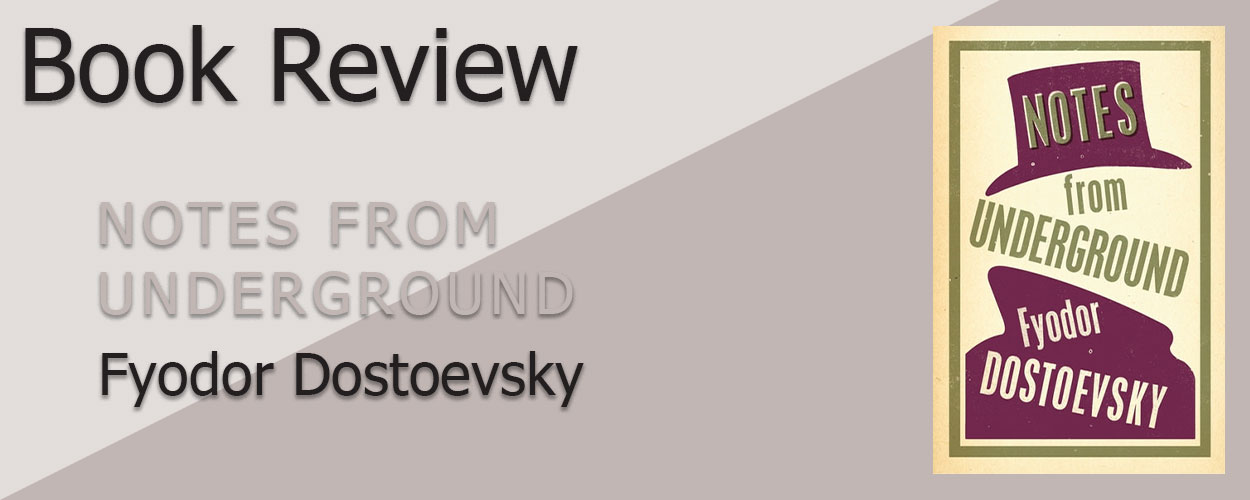

I liked it
Back in university, my professor gave us the first thirty pages of this book as a book cover and interior design practice/project. Of course I had to buy the full book when I saw it.
Read: July 2 – July 8, 2024
Genre: Classic, Historical
Audience: Adult
Book contains: pessimism, moral and political nihilism, rational egoism, determinism, utilitarianism
Purchase a copy from Amazon.ca
A nameless narrator details his regrets, musings, and recollections, framing the world through a nihilistic lens. He is a misanthropic and isolated individual who nonetheless delves into the deeper psyche and understanding of humanity.
Again, not my usual style, but when I first read this story in university, I actually got a really idealistic view of the world through the narrator’s eyes, and my professor thought I was crazy for saying so. Truly, he may spend pages upon pages talking about how horrible the world is and how much he hates people, but the narrator was also acknowledging his own faults in a way that implies he wants to change but doesn’t know how, and he spoke of the world’s faults like he was debating how to change the world for the better—despite not taking any action to do so. Maybe it’s just my own disposition that sees this book in that light, but I prefer it this way.
Dostoevsky takes the form of a nameless narrator who is writing in a personal diary—one he doesn’t intend to share with anyone. Still, he addresses the reader directly as if he is writing for an audience (for his own enjoyment, he claims). The first section is more abstract, containing his inner musings in a reflective sort of way, whereas part 2 takes the reader through actual memories and scenes.
I wanted to listen along to the free classic audiobook of this novel, but once again I had a different translation from those that are common, so I had to read this book the old-fashioned way. Because of this, it took me a few extra days to read.
I was not a fan of the narrator as a person, though I suppose that’s the point of his character. He is supposed to be petty and irrational. I did not understand his emotionally-driven actions, as I am a person of logic, even with immediate access to the inner workings of his mind.
The narrator has a pretty negative view of the entire world and those that preside in it, making his external relationships very interesting. He had a one-sided rivalry with an officer, whom he quarrelled with in such a way that it is unclear if the officer was even aware of it. His relationships with his “friends” were peculiar as he is not the type to make friends, even though he has timely bouts of the need for human interaction. The narrator is also quite the contrarian, in that he doesn’t want to spend time with people, but he wants to be invited to outings and get-togethers, and despite not wanting to go on these outings, refuses to cancel because of said invitation. He is not well-liked (this much is obvious) but there is a sort of charm to some of his actions, as seen by his somewhat romantic attachment to a prostitute whose acquaintance he made and wanted to help out of her dreary situation.
There is depth to this story—more depth than I can recognize. I found it quite philosophical, as it forced me to think more deeply about humans and the reasons behind their actions. It forced my eyes open to a completely different way of thinking—one I’m still wrapping my head around.
The pacing was decent, made easier by the splitting of the book into two parts. The first part was slightly harder to follow since the entirely of it seems to take place in a single room where the narrator is ruminating, but the second part more than made up for it by the constant movement and progression of the plot.
This book isn’t for the faint of heart, but it’s definitely an eye-opener. I recommend it to readers looking to expand understanding of human behaviour.
Crime and Punishment by Fyodor Dostoevsky
Great Expectations by Charles Dickens
The Scarlet Letter by Nathaniel Hawthorne
The Strange Case of Dr Jekyll and Mr Hyde by Robert Louis Stevenson
A Tale of Two Cities by Charles Dickens
Tigerpetal Press is a small book press dedicated to publishing local authors and poets.